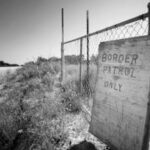With Britain having suffered another cold spell, with snow and ice disrupting both road and rail transport, many citizens are now demanding action from the country’s politicians. “Just what do the party leaders propose to do about this snow, eh? That’s what I want to know,” says sixty-six year old Henry Piddler, who recently spent two weeks snowed into his Sussex cottage as a result of the local council’s failure to grit local roads, and survived only by burning his clothes for warmth and eating his shoes for sustenance. “It’s bloody ridiculous – every time a single flake of snow falls the whole country is paralysed!” The pensioner – who was arrested for indecent exposure when he ran naked from his cottage to greet rescuers – echoes the sentiments of much of the public, with polls showing that defeating the weather has raced ahead of managing the economy and dealing with terrorism, as the issue most influencing the electorate in their voting intentions. Not surprisingly, opposition leader David Cameron has been quick to pledge that any Conservative government would be prepared to deploy the military against future outbreaks of freezing weather. “Clearly we have to stop this stuff before it even has a chance of reaching us,” he declared at a policy launch in Birmingham last week. “To this end, we’re proposing to scramble RAF fighter aircraft the moment the Met Office tells us a cold front is coming in. The pilots will be under orders to shoot down any clouds they suspect of harbouring snow.” Cameron concedes that cloud interception by the RAF might not prevent all snow fall, but has assured the public that a Tory government would have a contingency plan. “Soldiers will be stationed at major road and rail junctions, with orders to fire their guns into the air in order to destroy any snow flakes before they can reach the ground,” he explains. “In this way we would hope to prevent the traffic congestion caused by recent snow falls.” Cameron has roundly rejected suggestions that using military force against bad weather constitutes an overreaction to a temporary natural phenomena. “Let’s not forget the way that several counties were left devastated by the snow last year,” he says. “Look at what happened on the M3 – hundreds of drivers were trapped in their cars and forced into cannibalism in order to survive! We have to start fighting back!”
In addition to regular forces, Cameron revealed that the Conservatives also had advanced plans to set up a cold weather ‘Home Guard’ of ordinary citizens, which would be mobilised whenever snow struck. “They’d be authorised to fight this white evil with any available weapon – blow torches, steam irons, shotguns – anything that can destroy or intimidate it,” Cameron announced. “We need to show this icy bastard that we won’t be cowed by it! If we give it a hostile enough welcome maybe it will finally get the message and bugger off for good!” Most controversial amongst the opposition’s new weather policies are their plans to have all snowmen shot on sight. “They’re clearly collaborators, trying to make the cold weather seem appealing and acceptable,” says the Tory leader. “I ask you – when have you actually seen a snowman being made by human hand? They just spontaneously appear when the snow falls!” The proposals have had a mixed reception, with many of those who have suffered during the recent cold spell welcoming them. “Sending in the army is the right thing to do,” commented Henry Piddler. “It’s about time they earned their bloody money! It’s alright for them, sunning themselves in Afghanistan – they’ve no idea what people have been going through here!” However, the plans have been condemned by the government. “The use of military force against winter weather would be both inappropriate and disproportionate,” opines Dick Dribbler, the newly appointed Minister for Weather. “Despite the chaos it brings, we must remember that this weather is unarmed and essentially non-aggressive.” Dribbler believes that recent instances of freezing conditions have been the result of foreign cold systems attempting to illegally enter the UK. “This quite obviously an immigration problem,” he says. “As I understand it, this cold air originates in Siberia and is attracted to the UK by our higher wages and superior health care systems. What we need to do is detain this weather as it enters our airspace and return it to its country of origin. Obviously, if any of these cold fronts is escaping oppression at home, then it could have a legitimate case for asylum and will have to be kept in an asylum seekers centre until its case is heard.”
However, with opinion polls indicating that the electorate seem to favour the Tories’ tougher approach to weather, Prime Minister Gordon Brown announced to the House of Commons that the government had drawn up contingency plans to detonate a small nuclear device in Suffolk in the event of another prolonged period of freezing weather. “This would generate sufficient heat to both disperse the cold front and raise temperatures in the rest of the country to acceptable levels,” he said. “Of course, it would result in the destruction of Ipswich, and possibly Harwich, and would leave a large swathe of East Anglia uninhabitable for several generations. However, I’m sure that the British public will agree that this would be a small price to pay for their warmth.” Meteorologists remain unimpressed by any proposals to combat bad weather with military force. “It’s bloody ridiculous,” says Bill Singe local weather forecaster for Droitwich Community TV. “Weather isn’t a sentient being! It can’t be hurt! It’s just a meteorological phenomena!” Moreover, Singe believes that many of the problems reportedly cause by the recent cold spells have been greatly exaggerated. “Take that Piddler bloke, his so-called ‘remote cottage’ was on a bloody housing estate only a few hundred yards from a supermarket and a main road,” he points out. “He has form for this sort of thing – during those floods the other year he nicked for running down his street stark naked apart from a snorkel and diving mask, despite there only being a couple of big puddles outside his house!” Singe’s views have been dismissed proponents of military action. “They’re in no position to criticise – they’re the ones who whip up the panic in the first place, with their severe weather warnings and talk of ‘treacherous’ roads,” says military historian Clive Wrench, one of the key advisors to Cameron on his new weather policy. “Let’s not forget that in 1944 in the Ardennes the Germans were so easily able to sweep past US forces during far worse weather conditions than we’ve recently experience here, because the Americans had paid too much attention to those severe weather warnings. They’d heeded police advice to stay off the icy roads unless their journeys were essential, and had parked their Sherman tanks up at the roadside. No wonder they were unable to mount a defence in the face of hundreds of German tanks which dared to drive on untreated roads!” According to Wrench, the siege of Bastogne was only relieved when General Patton arrived with additional grit supplies. “The US defenders had refused to advance until the roads had been gritted and salted,” he asserts. “If they’d shown more gumption and attacked the weather rather than worrying about the state of the roads, then they’d have been able to break out sooner and assault the Germans! The whole Battle of the Bulge would have been over far quicker!”












